After enrolling in the Vatican’s Laudato Si’ Action Platform, participants were asked to complete an online questionnaire.
This self-assessment included questions about our current practices across the Laudato Si’ Goals. This allows us to understand where we are on the road to integral ecology and envision where we might go from here.
Responding to the cry of Earth
Have you planted trees in the past 12 months? If so, how many?
More than 500, with 460 alone planted at a school administered by our sisters in the Philippines as part of a diocesan graduation requirement for students.
How do you tend to your gardens, lawns and land in ways that care for Earth?
Some of our properties are careful to use little or no fertilizers and insecticides, and to conserve water as we can through activities such as the collection of rainwater.
Have you protected your land from development in any way, such as putting your land into a conservation agreement?
We have several properties in the U.S. that have been protected from development over the past 14 years, for a total of 385 acres in Michigan, Nebraska, Pennsylvania and Rhode Island. Properties in the Philippines have been reforested or are on government-protected land.
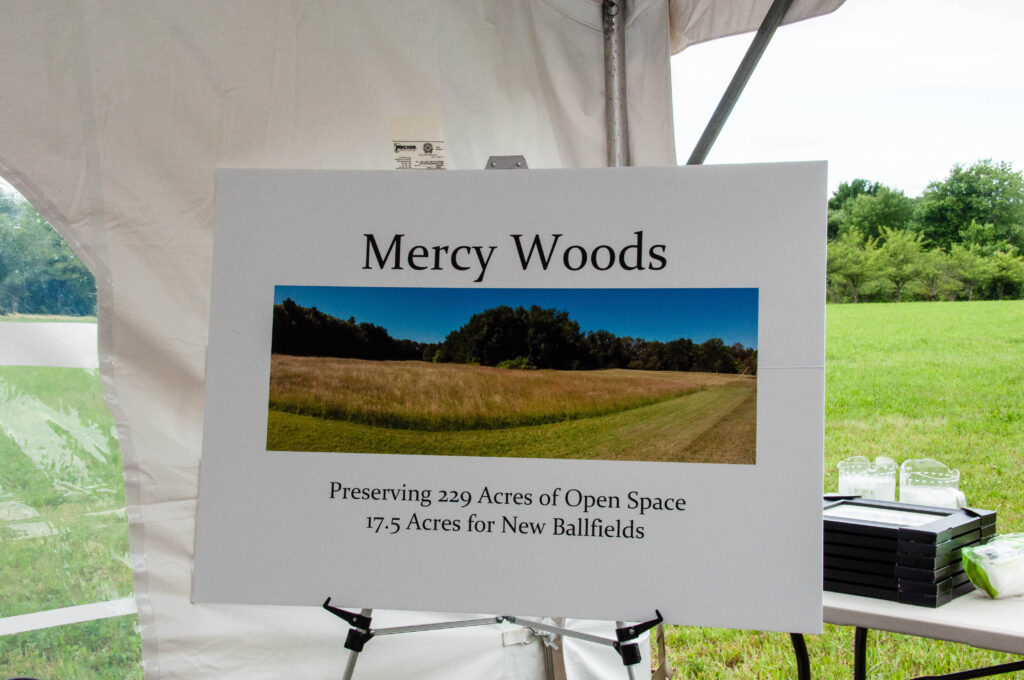
A photo from the celebration announcing the formation of Mercy Woods in Cumberland, Rhode Island 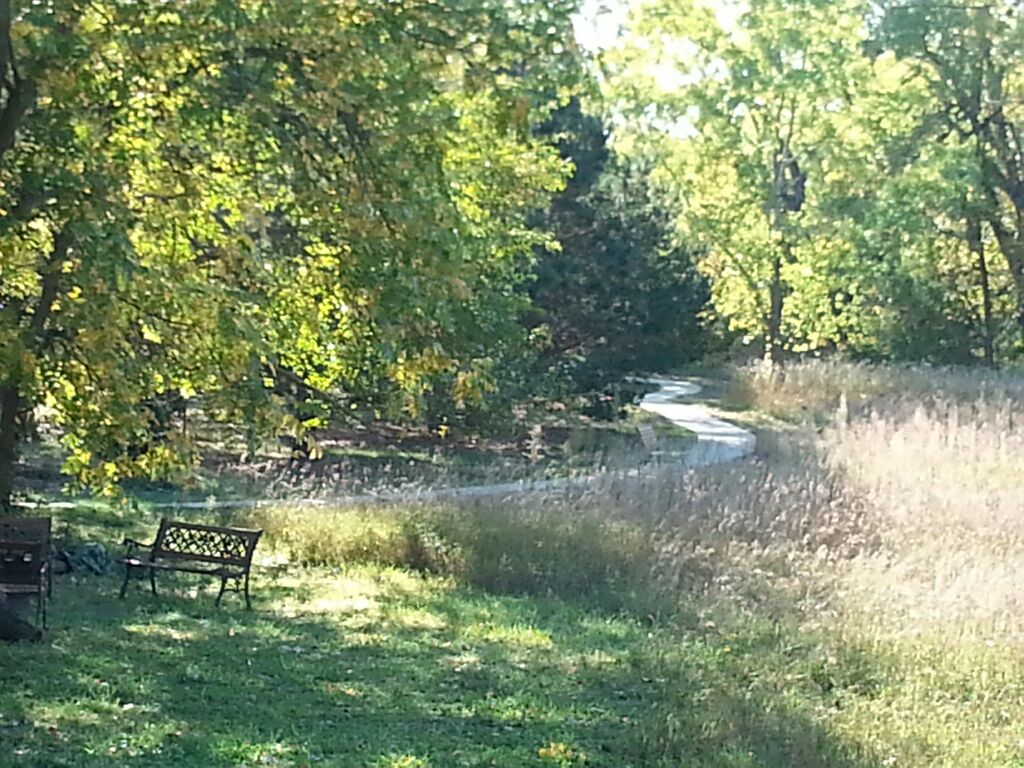
A pathway that cuts through part of the conservation easement near Omaha, Nebraska 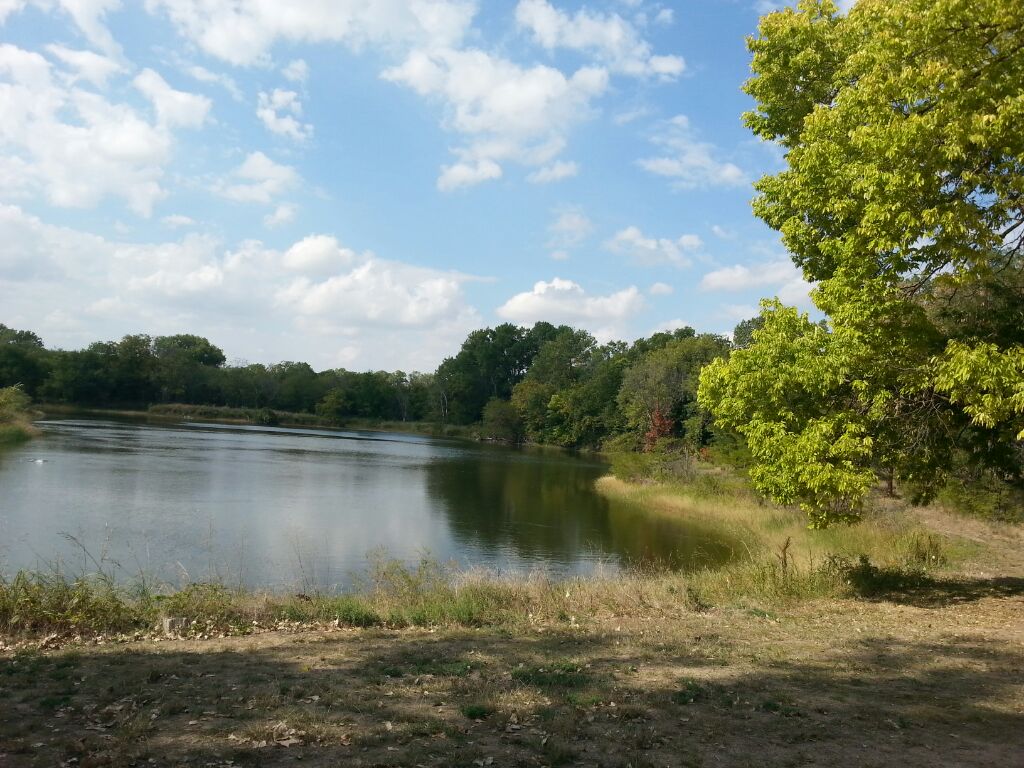
A view of the conservation easement along the Platte River near Omaha, Nebraska 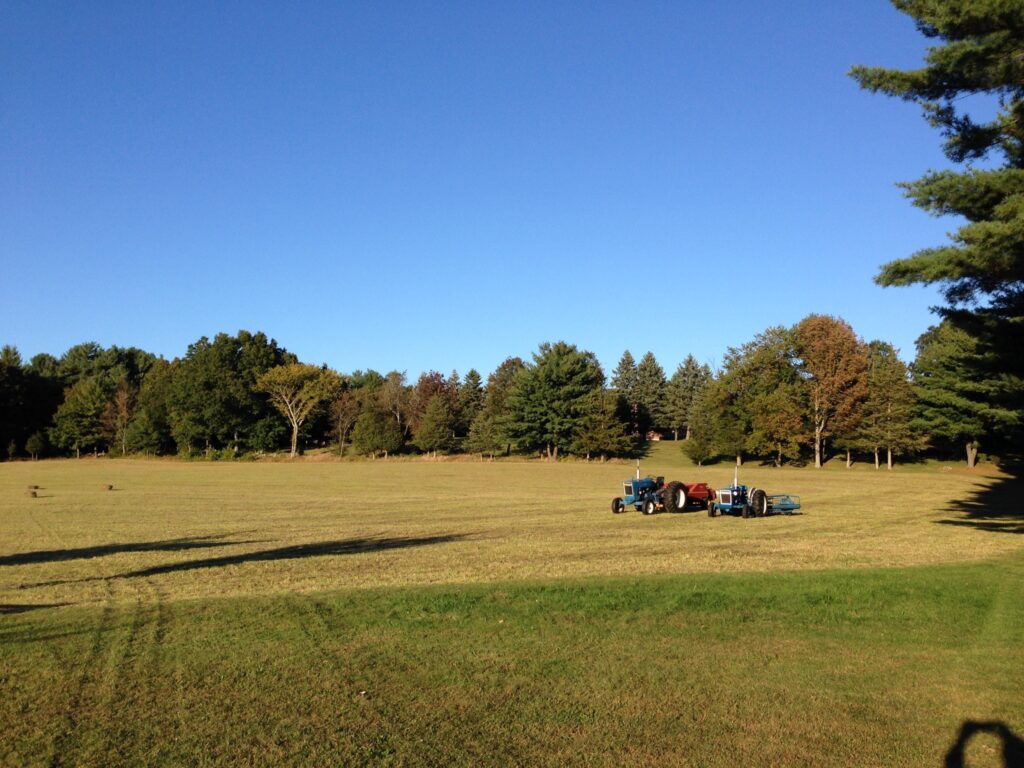
A view of Mercy Woods in Cumberland, Rhode Island
Responding to the cry of the poor
In the past 12 months, how have you taken action to respond to the cry of the poor? Please share freely any initiatives that are meaningful to you.
Mercy Focus on Haiti (MFOH) provides services to the ultra-poor in Haiti in partnership with other organizations and another religious order. This includes an agronomy program that supports farmers and their families in activities such as sweet potato weevil eradication, container and family gardens, reforestation, soil enhancement, seed development, and animal husbandry.
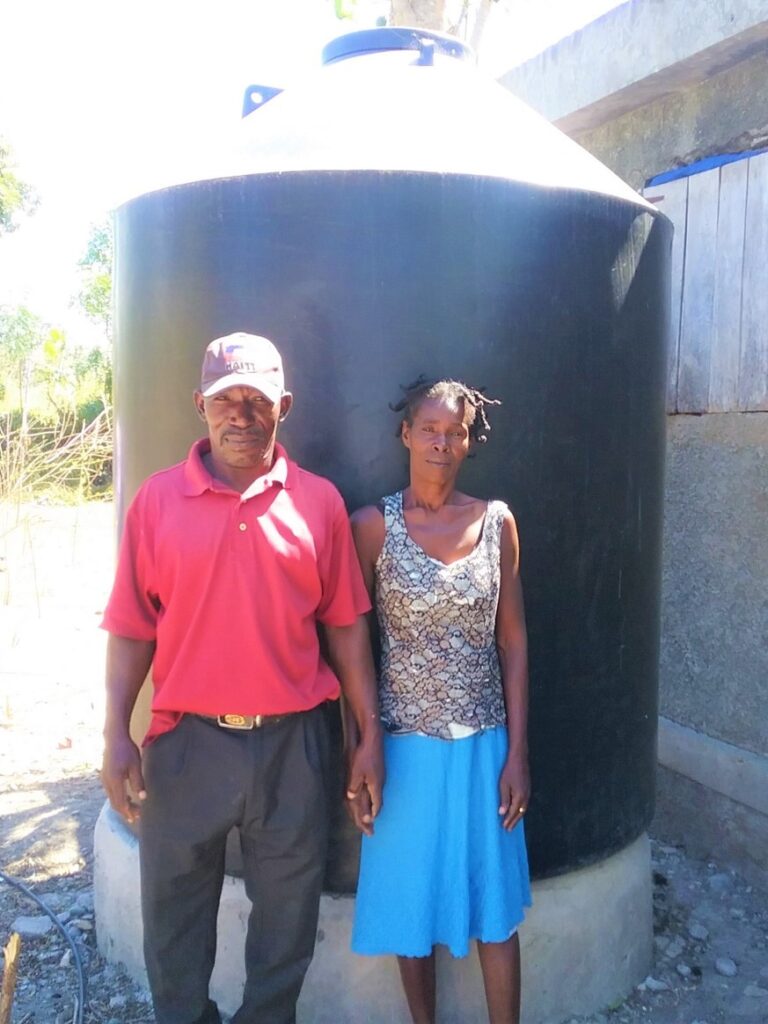
MFOH also supports the hen house and egg production program, which supplies the local community with fresh eggs. Additionally, MFOH provides training and funding for a rainwater harvesting program in the Gros Morne region. These support farmers and their families for both agricultural and domestic purposes, as well as helping to control soil erosion during torrential storms.
In Honduras, sisters and associates took care of children in conditions of abandonment (most of them are HIV carriers); provided emotional and spiritual accompaniment to women who are human-rights and territorial defenders; visited and supported a group of indigenous Tolupan women; and obtained support for 15 families to improve their homes in 2021. They have prioritized the organization of women’s networks in different territories, and they monitor issues of gender violence, displacement, territorial conflicts and natural disasters. As part of this work, they run a violence observatory and also develop training processes and self-care workshops for women defenders.
In the United States, ministries on the border with Mexico address the health needs of the neediest residents of Laredo, Texas, and its surrounding area, and ARISE Adelante empowers women and youth to strengthen their communities in the Rio Grande Valley.
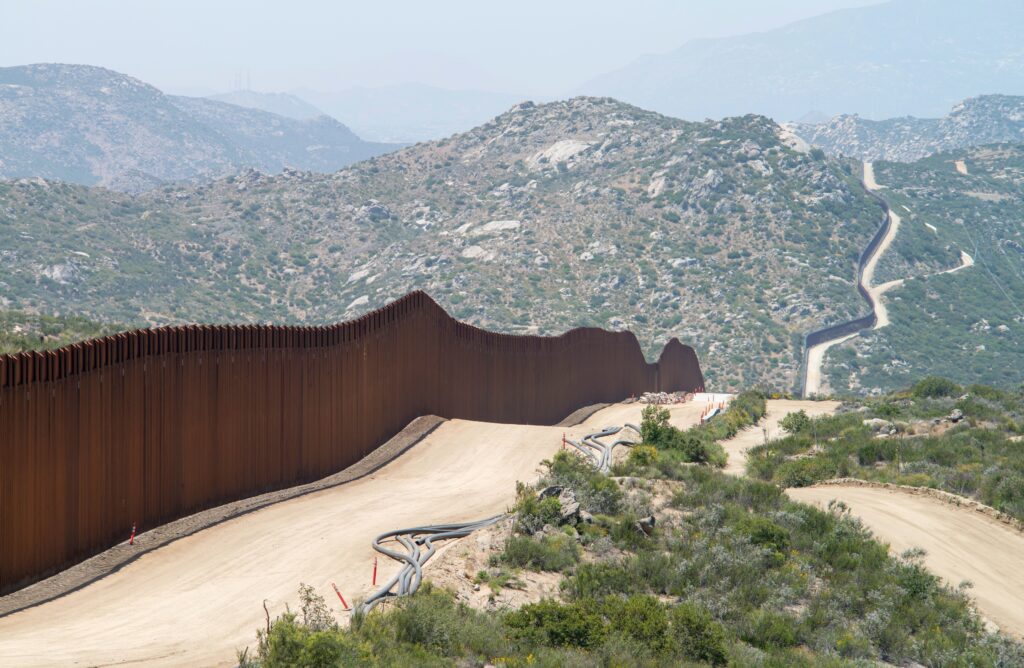
Many of our ministries assist families with food and with gardens, often providing the seeds for food plants. A sister in Argentina helped deliver trees and firewood from an orchard that was being cleared.
As Laudato Si’ says, “a true ecological approach always becomes a social approach.” (LS 49) Have you identified how the planetary crisis is affecting social issues (such as hunger, forced migration, or respiratory illnesses)?
We understand that all environmental problems are social, economic, political, cultural and spiritual. A change in the capitalist-extractivist system is urgently needed to save human and non-human life and lead us to a more just, inclusive and peaceful world. Extractivism, environmental degradation and climate change have led to forced migration. In many places, the rivers are dying and so is the life in them. This has affected the people who make their living from fishing, and it has affected the rain cycles for agriculture. In some places, the growing poverty and income inequality contribute to recruitment of young people by gangs and organized crime.
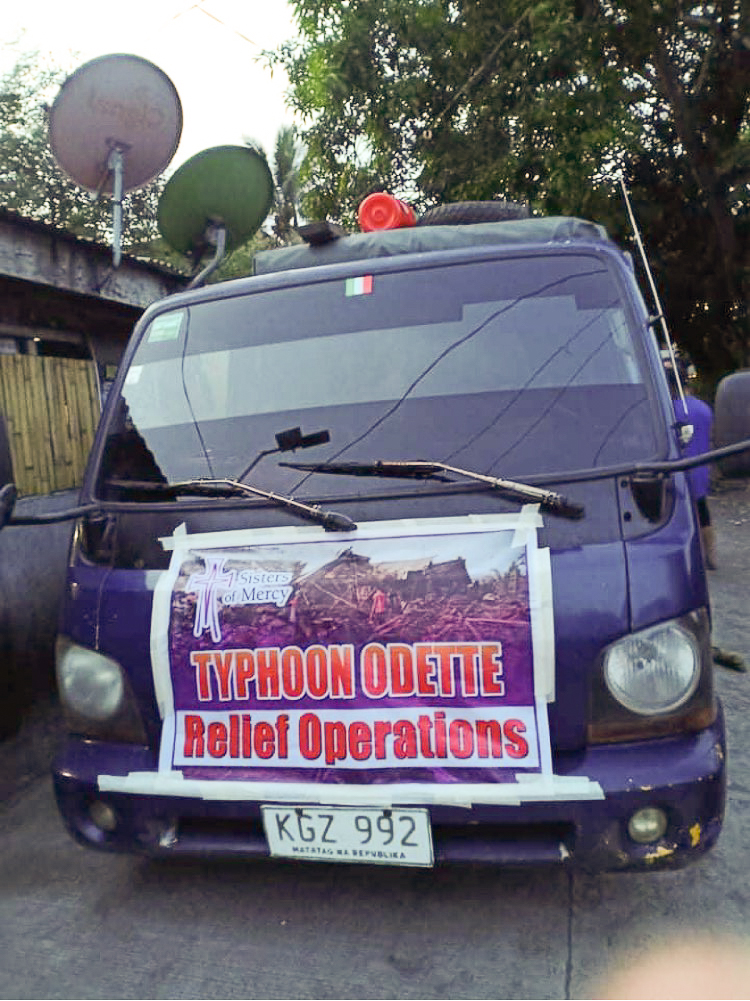
How have you responded to the immediate, short-term needs of vulnerable people?
Many ministries throughout the Institute are focused on meeting the immediate, short-term needs of vulnerable people.
In the past year, of special note is the response of sisters in the Philippines to the immediate needs of victims of Typhoon Rai (also known as Odette) in the middle part of the country in December 2021. They brought relief goods: rice, water, canned goods, dried fish, candles, pail, biscuits, coffee, sugar and soap. They helped some victims with cash, especially those whose houses were blown down or washed out by big waves.
In Honduras, sisters and associates visited and accompanied a group of rural women from the Ocote community, who were survivors of Hurricanes Eta and Iota in 2020, supporting them with food, tools and health screenings.
Have you developed or participated in any initiatives that address the underlying causes of these social-ecological challenges?
About 10 years ago, Mercy engaged hundreds of people in the U.S., Central and South America, and the Philippines in Awakening the Dreamer programs, which focus on creating an environmentally sustainable, spiritually fulfilling, socially just human presence on this planet. Many followed up with the Game Changer program, and the Justice Team developed resources under the Mercy Taking Action banner. In Central and South America, sisters and associates participated in and were trained in an Alternatives to Violence program, In the U.S., the Justice Team has educated and advocated on the root causes of migration and climate change, and is actively participating in the Poor People’s Campaign that shows integration of many issues of concern.
Ecological economics
Have you divested from fossil fuels, weapons, and other investments that harm creation and human ecology? Or, if you’ve never had this type of investment, have you pledged that you won’t make such investments in the future?
Mercy Investment Services, the asset management program for the Sisters of Mercy of the Americas and 47 sponsored and co-sponsored ministries, uses portfolio screens to avoid investing in certain companies whose products, services or activities contradict our guiding principles. This includes not investing in corporations engaged in the production of thermal coal or oil sands.
In addition, Mercy Investments is intentionally and continually decreasing investments in minerals and precious mining as well as fossil fuels. Mercy Investment Services has reduced its extractive holdings, or stocks in companies that produce oil, coal and gas, or mine for precious metals, minerals and aggregates, by more than 60% since 2017.
Have you invested in socially responsible enterprises, such as renewable energy?
Mercy Investment Services seeks investments in companies with positive environmental, social and governance records in these areas: employment or advancement of women and underrepresented populations; diversity in governance through appropriate board membership of women and underrepresented populations; just employment practices and vendor standards; positive environmental record and/or effective environmental policies designed to reduce environmental impact and promote sustainability of life, especially water; protection or advancement of human rights; and promotion of nonviolence.
Mercy Investment Services’ Environmental Solutions Fund encompasses 30 market-rate, scalable environmental investments focused on renewable energy, energy and water efficiency, materials recycling, green buildings and sustainable agriculture.
Mercy Partnership Fund invested in: financial intermediaries providing capital to clean energy projects in low-income communities; community development financial institutions committed to serving underserved communities; clean cookstoves in Eritrea and Ethiopia for the benefit of women; sanitation projects benefiting women and girls in India and other low- and middle-income countries; and other opportunities focused on rectifying socio-economic inequalities.
Our thematic investments include green and social bonds and an equity strategy dedicated to water solutions. These thematic investments comprise 10% of the portfolio.
In addition, Mercy Investment Services invests in a global water equity strategy consisting of companies whose innovative technologies and products address the increase in water supply and access through water treatment, analytics and metering; the reduction of water demand and waste through improved infrastructure and fluid control; and the improvement of water quality through solutions that support water utilities throughout the world.
Have you chosen a banking company or insurance company that has clear ethical and social standards?
The Sisters of Mercy Finance Department is taking into consideration environmental awareness and practices by potential significant vendors when writing Requests for Proposals (RFPs) for services. Two recently completed major proposal processes included inquiries about sustainability efforts and policies as well as interfaces with clean energy and technology firms.
Sustainable lifestyles
Have you developed a structured process to reduce your use of heating and air conditioning?
Not yet.
How are you conserving water?
In some places, sisters and associates are collecting rainwater or re-using water for various purposes. More than 1,000 people associated with Mercy in July 2020 participated in a month-long process of education and reflection on water as a sacred gift, which included tips for reducing water.
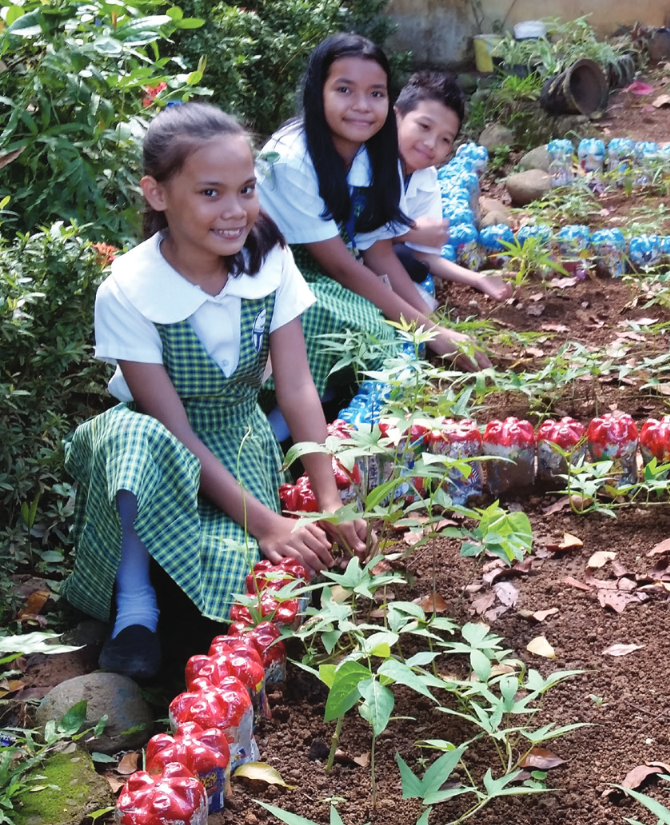
Have you installed low-flow fixtures (such as faucets, toilets, or showers)?
In some places.
Have you installed dry toilets (such as composting or sand toilets)?
One ministry in Jamaica has done this.
How do sisters and co-workers mostly get around, i.e. by car, public transportation, walking, cycling or other means?
Sisters and associates in the Philippines, Central and South America model use of shared vehicles, taking public transportation, and walking and bicycling for transportation. In the United States, individual use of cars is more common.
Do you compost food scraps?
In some places, including in our main Institute office.
Have you minimized meals featuring meat (chicken, beef, pork, goat, or fish) in your houses and ministries?
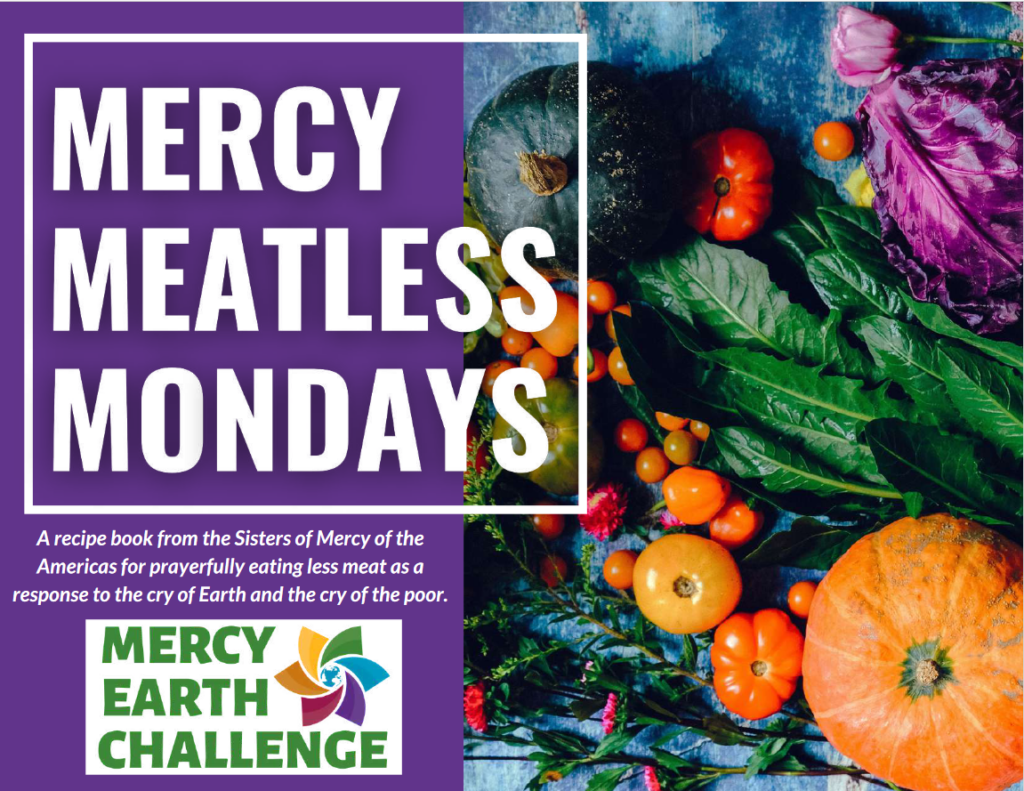
We launched Mercy Meatless Mondays to encourage eating less meat. Anecdotally, we are aware that many individuals have adopted this practice. We are only aware of a couple of ministries that have intentionally reduced the serving of meat in response to this initiative.
Are you actively reducing use of disposable plastic or styrofoam?
Sisters in the Philippines issued a position paper in 2018 committing to reducing the use of plastics, aspiring to zero-waste management, as well as to participating in coastal and ocean clean-up efforts and planting trees and mangroves. The year-long Mercy Earth Challenge in January 2021 encouraged more than 1,000 participants throughout the Institute to reduce their use of plastics. A Mercy healthcare system based in Missouri instituted a policy to eliminate disposable plastic water bottles.
Ecological education
In the past 12 months, how have you taken action to institute ecological education? Please share freely any initiatives that are meaningful to you.
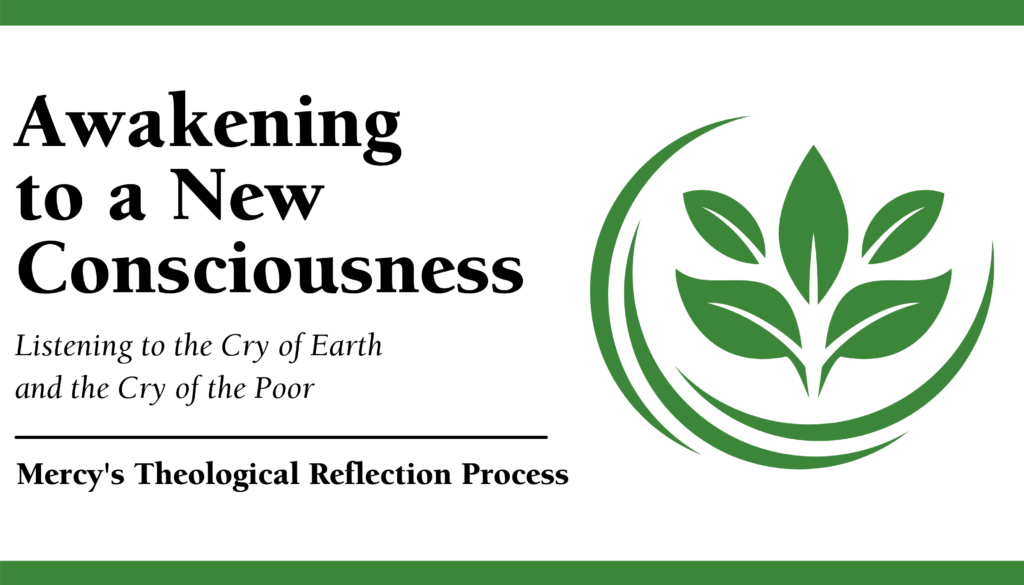
We developed the Awakening to a New Consciousness theological reflection process on extractivism, with more than 300 participants. Ministries and individual sisters and associates educate others in practices that care for the Earth, such as giving food seeds to encourage gardens and teaching about composting. We are beginning to offer education on natural burials. Individual sisters and associates in Central and South America use the radio to educate listeners on ecological issues through the lens of Laudato Si, including the destruction of the extractivist market system. The Justice Team co-hosted educational webinars on reducing plastics and sacred eating with Mercy Ecology and offered a movie and discussion on plastics. The Prophetic Voice Commission of Central and South America and the Caribbean hosted a workshop on extractivism. Also, two Justice Team members participated in Mercy Global Action’s working group on water and climate to advance themes and advocacy messaging for COP26.
Have you developed opportunities for young people to lead Laudato Si’ initiatives?
Yes, primarily in our schools, colleges and universities
Ecological spirituality
In the past 12 months, how have you taken action to embrace ecological spirituality? (Examples include: celebrating the Season of Creation, praying outdoors, weaving creation into liturgical practices, and developing interreligious dialogue.) Please share freely any initiatives that are meaningful to you.
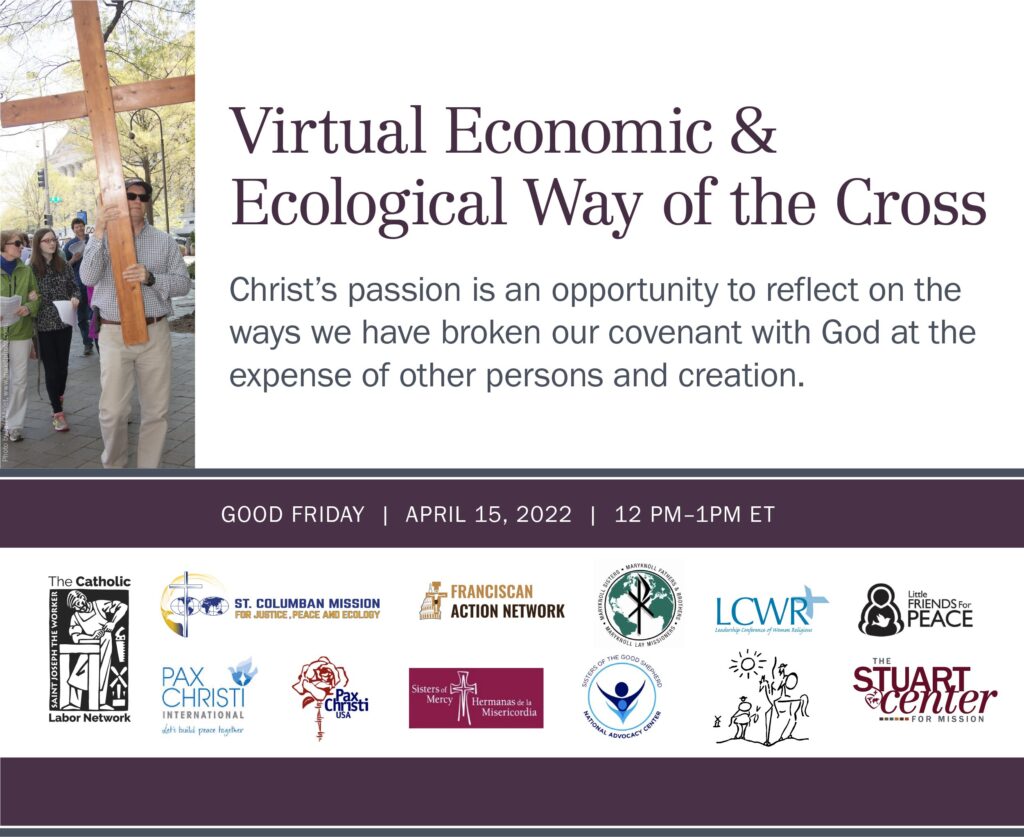
We encouraged sisters, associates and others to participate in Laudato Si Week and World Water Day with prayer and action. We promoted a rosary of creation created by a sister in Argentina and promoted a COP26 prayer vigil organized by our partners, the Columbans. We offered online mini-retreats with Dr. Catherine Wright of Wingate University and Dr. Sasha Adkins of Loyola University Chicago. A Justice Team member prayed with indigenous leaders while visiting their land threatened by the Line 3 pipeline. Prayers before meetings and programs often incorporate ecological themes. We co-sponsored the annual Economic and Ecological Way of the Cross on Good Friday that stops at symbols of power in Washington, D.C., to offer prayers and reflections.
In the past 12 months, have you held spiritual activities outdoors?
Some convents, schools and ministries have prayer services, praying of the rosary and even liturgies outside for Earth Day and other special occasions. But this is not a common practice throughout the Institute.
Community participation
In the past 12 months, how have you taken action with the community in which you live? (Examples include advocating for socio-ecological issues, better governance, and human rights, engaging the public, developing a shared response to challenges, and creating plans to adapt resiliently to climate change.) Please share freely any initiatives that are meaningful to you.
Throughout our Institute, sisters, associates and co-workers participated in local and regional groups that are addressing socio-ecological harms from mining, fracking, climate change, agricultural pesticides and GMOs and protection of human rights and environmental defenders.
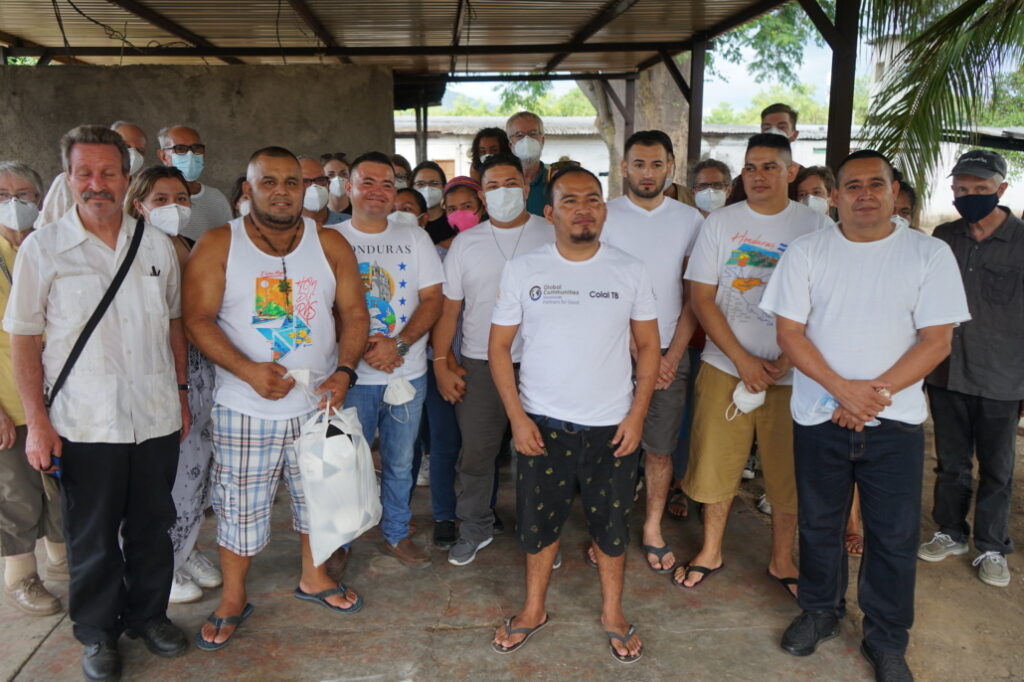
Some highlights in the U.S. include co-sponsoring an ecumenical conference, Ecumenical Advocacy Days, which in 2021 focused its education and advocacy on climate justice; participating in public witness events in Washington, D.C., and local communities around the U.S.; engaging our network in 64 advocacy campaigns with the U.S. government. We have been in solidarity with human rights defenders, including the Line 3 resistance and the Poor People’s Campaign. The Justice Team met with U.S. legislators virtually to advocate for global vaccine equity, the release of funding to struggling countries through the International Monetary Fund, a ban on imports into the U.S. of goods sourced through illegal deforestation, and environmental justice measures. There was also extensive advocacy with the Biden administration, Senate and key congressional offices to support the Guapinol water defenders of Honduras. Sister Aine O’Connor of our Institute Leadership Team joined other faith leaders in meetings with the federal Environmental Protection Agency administrator and members of the Senate Bipartisan Climate Solutions Caucus. The Justice Team has engaged with REPAM to support efforts to protect the Amazon rainforest and its people.
General questions
Have you included Laudato Si’ themes in your life and/or ministry?
Laudato Si’ themes are integrated throughout our ministries and way of life, although not explicitly named as such most of the time. The Justice Team refers to Laudato Si’ frequently in our education and advocacy on our Critical Concern for Earth. More specifically, the encyclical inspired the year-long Mercy Earth Challenge, which invited more than 1,000 people to examine their lifestyles after deepening their understanding of Laudato Si, from May 2020 through April 2021. Our months-long Awakening to a New Consciousness theological reflection process invited more than 300 participants to examine the harms of extractivism through the lens of Laudato Si.
Does any person/committee/team in your community have a clear mandate to lead Laudato Si’ action?
The Institute hired a full-time climate and sustainability director over the past year, to work with our Climate Response Steering Committee to achieve our goal of net-zero greenhouse gas emissions by 2045. Over the next year, he will collect information on our current emissions – including from heating and cooling, our fleet of vehicles, air travel and food consumption – so that we can identify actions to reach that goal. He also will be collecting information on water usage. The Justice Team is responsible for educating our community about social and environmental justice, and animating and equipping us for advocacy for systemic change.
Have you identified a point person who has received training in environmental science and Catholic social teaching on ecology?
We have several sisters who are educated in these fields
Did any of your sisters take on new leadership of Laudato Si’ initiatives in the past 12 months?
A committee made up of sisters from Panama, the Philippines and the United States, along with the director of the Justice Team, developed and implemented Awakening to a New Consciousness, the five-months-long theological reflection process on extractivism.
In addition, many sisters have taken on new projects in their local communities. For instance, in the Philippines, Sister Virgencita Alegado started an organic garden in her school, Holy Cross High School at Kolambugan, Lanao del Norte.
Have you established a relationship with another religious community to work on Laudato Si’ themes together?
In the U.S., we work closely with the Leadership Conference of Women Religious and justice promoters of other religious congregations at the national and regional levels. Collaborative activities have included inviting one another to educational forums and participating in advocacy activities such as letters to government officials and public witness events related to Laudato Si themes.
Sisters in the Philippines are very involved with the Sisters Association in Mindanao, and Mercy Focus on Haiti is in partnership with the Religious of Jesus and Mary.
In the past 12 months, have you collaborated on Laudato Si’ issues with any Catholic organizations that are not religious communities? For example, you may have worked with a parish, hospital, university, lay movement, or NGO.
We collaborate closely with the Laudato Si Movement and the Catholic Climate Covenant, and a member of our Justice Team serves on advisory and governance bodies with each of them. Our sisters work closely with many other Catholic organizations in their local and regional areas.